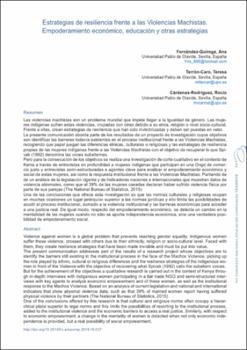Estrategias de resiliencia frente a las Violencias Machistas. Redes de mujeres y Empoderamiento económico, educación y otras estrategias frente a las barreras de la legislación vigente
Date
2018Abstract
Las violencias machistas son un problema mundial que impide llegar a la Igualdad de género. Las mujeres
indígenas sufren estas violencias, cruzadas con otras debido a su etnia, religión o nivel socio-cultural.
Frente a ellas, crean estrategias de resiliencia que han sido invisibilizadas y deben ser puestas en valor.
La presente comunicación aborda parte de los resultados de un proyecto de investigación cuyos objetivos
son identificar las barreras todavía existentes en el proceso institucional frente a las Violencias Machistas,
recogiendo que papel juegan las diferencias étnicas, culturales o religiosas y las estrategias de resiliencia
propias de las mujeres indígenas frente a las Violencias Machistas con el objetivo de recuperar lo que Spivak
(1992) denomina las voces subalternas.
Pero para la consecución de los objetivos se realiza una investigación de corte cualitativo en el contexto de
Kenia a través de entrevistas en profundidad a mujeres indígenas que participan en una Ongd de comercio
justo y entrevistas semi-estructuradas a agentes clave para analizar el empoderamiento económico y
social de estas mujeres, así como la respuesta institucional frente a las Violencias Machistas. Partiendo de
de un análisis de la legislación vigente y de Indicadores naciones e internacionales que muestran datos de
violencia abismales, como que el 39% de las mujeres casadas declaran haber sufrido violencia física por
parte de sus parejas (The National Bureau of Statistics, 2015)
Una de las conclusiones que ofrece esta investigación es que las normas culturales y religiosas ocupan
en muchas ocasiones un lugar jerárquico superior a las normas jurídicas y ello limita las posibilidades de
acudir al proceso institucional, sumado a la violencia institucional y las barreras económicas para acceder
a una justicia real. De igual modo, respecto del empoderamiento económico, se detecta un cambio en la
mentalidad de las mujeres cuando no sólo se aporta independencia económica, sino una verdadera posibilidad
de empoderamiento social. Violence against women is a global problem that prevents reaching gender equality. Indigenous women
suffer these violence, crossed with others due to their ethnicity, religion or socio-cultural level. Faced with
them, they create resilience strategies that have been made invisible and must be put into value.
The present communication addresses part of the results of a research project whose objectives are to
identify the barriers still existing in the institutional process in the face of the Machos Violence, picking up
the role played by ethnic, cultural or religious differences and the resilience strategies of the indigenous women
in front of the Violence with the objective of recovering what Spivak (1992) calls the subaltern voices.
But for the achievement of the objectives a qualitative research is carried out in the context of Kenya through
in-depth interviews with indigenous women participating in a fair trade NGO and semi-structured interviews
with key agents to analyze economic empowerment and of these women, as well as the institutional
response to the Machos Violence. Based on an analysis of current legislation and national and international
indicators that show abysmal violence data, such as that 39% of married women report having suffered
physical violence by their partners (The National Bureau of Statistics, 2015).
One of the conclusions offered by this research is that cultural and religious norms often occupy a hierarchical
place superior to legal norms and this limits the possibilities of resorting to the institutional process,
added to the institutional violence and the economic barriers to access a real justice. Similarly, with respect
to economic empowerment, a change in the mentality of women is detected when not only economic independence
is provided, but a real possibility of social empowerment.





